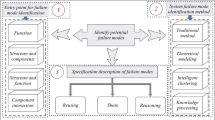Abstract
The stable convergence and efficiency of reliability-based design optimization (RBDO) using performance measure approach (PMA) are the major issue to develop the reliability methods based on modified chaos control (MCC), hybrid chaos control (HCC) and finite-step length adjustment (FSL). However, these methods may be inefficient for RBDO problems with convex and concave probabilistic constraints. In this paper, an adaptive modified chaos control (AMC) is proposed to provide the robust and efficient results in RBDO. The proposed AMC is adjusted using dynamical chaos control factor, which is extracted using sufficient descent condition for PMA. Using sufficient criterion, the proposed AMC is adaptively combined with advanced mean value (AMV) to improve the performance of PMA, named as hybrid adaptive modified chaos control (HAMC). Considering the robustness and efficiency, the proposed HAMC is compared with several existing reliability methods by three nonlinear structural/mathematical performance functions and two RBDO problems. The results indicate that the proposed HAMC with sufficient descent condition provides superior convergences in terms of both robustness and efficiency, compared to existing PMA methods using AMV, MCC, HCC and FSL.





Similar content being viewed by others
References
Zhu S-P, Hao Y-Z, Liao D (2019) Probabilistic modeling and simulation of multiple surface crack propagation and coalescence. Appl Math Model 78:383–398. https://doi.org/10.1016/j.apm.2019.09.045
Zhu S, Liu Q, Zhou J, Yu Z (2018) Fatigue reliability assessment of turbine discs under multi-source uncertainties. Fatigue Fract Eng Mater Struct 41(6):1291–1305
Zhang J, Xiao M, Gao L, Chu S (2019) A combined projection-outline-based active learning Kriging and adaptive importance sampling method for hybrid reliability analysis with small failure probabilities. Comput Methods Appl Mech Eng 344:13–33. https://doi.org/10.1016/j.cma.2018.10.003
Koduru SD, Haukaas T (2010) Feasibility of FORM in finite element reliability analysis. Struct Saf 32(2):145–153
Ping Y, Zuo Z (2016) Step length adjustment iterative algorithm for inverse reliability analysis. Struct Multidiscip Optim 54(4):1–11
Keshtegar B, Zhu S-P (2019) Three-term conjugate approach for structural reliability analysis. Appl Math Model 76:428–442. https://doi.org/10.1016/j.apm.2019.06.022
Zhang J, Xiao M, Gao L, Fu J (2018) A novel projection outline based active learning method and its combination with Kriging metamodel for hybrid reliability analysis with random and interval variables. Comput Methods Appl Mech Eng 341:32–52. https://doi.org/10.1016/j.cma.2018.06.032
Meng Z, Yang D, Zhou H, Yu B (2018) An accurate and efficient reliability-based design optimization using the second order reliability method and improved stability transformation method. Eng Optim 50(5):749–765
Meng Z, Zhou H, Hu H, Keshtegar B (2018) Enhanced sequential approximate programming using second order reliability method for accurate and efficient structural reliability-based design optimization. Appl Math Model 62:562–579. https://doi.org/10.1016/j.apm.2018.06.018
Lee I, Noh Y, Yoo D (2012) A novel second-order reliability method (SORM) using noncentral or generalized Chi squared distributions. J Mech Des 134(10):89. https://doi.org/10.1115/1.4007391
Valdebenito MA, Schuëller GI (2010) A survey on approaches for reliability-based optimization. Struct Multidiscip Optim 42(5):645–663. https://doi.org/10.1007/s00158-010-0518-6
Du X, Chen W (2003) Sequential optimization and reliability assessment method for efficient probabilistic design. J Mech Des 126(2):871–880
Zeng M, Zhou H (2018) New target performance approach for a super parametric convex model of non-probabilistic reliability-based design optimization. Comput Methods Appl Mech Eng 339:644–662
Jiang C, Qiu H, Li X, Chen Z, Gao L, Li P (2019) Iterative reliable design space approach for efficient reliability-based design optimization. Eng Comput. https://doi.org/10.1007/s00366-018-00691-z
Choi SH, Lee G, Lee I (2018) Adaptive single-loop reliability-based design optimization and post optimization using constraint boundary sampling. J Mech Sci Technol 32(7):3249–3262
Fan L, Wu T, Badiru A, Hu M, Soni S (2013) A single-loop deterministic method for reliability-based design optimization. Eng Optim 45(4):435–458
Keshtegar B, Hao P (2018) Enhanced single-loop method for efficient reliability-based design optimization with complex constraints. Struct Multidiscip Optim 57:1731–1747
Liang J, Mourelatos ZP, Tu J (2008) A single-loop method for reliability-based design optimization. Int J Prod Dev 5(1/2):76–92
Shan S, Wang GG (2017) Reliable design space and complete single-loop reliability-based design optimization. Reliab Eng Syst Saf 93(8):1218–1230
Hao P, Ma R, Wang Y, Feng S, Wang B, Li G, Xing H, Yang F (2019) An augmented step size adjustment method for the performance measure approach: toward general structural reliability-based design optimization. Struct Saf 80:32–45. https://doi.org/10.1016/j.strusafe.2019.04.001
Keshtegar B (2017) A modified mean value of performance measure approach for reliability-based design optimization. Arab J Sci Eng 42(3):1093–1101. https://doi.org/10.1007/s13369-016-2322-0
Youn BD, Choi KK, Du L (2005) Adaptive probability analysis using an enhanced hybrid mean value method. Struct Multidiscip Optim 29(2):134–148
Peng H, Wang Y, Chen L, Bo W, Hao W (2017) A novel non-probabilistic reliability-based design optimization algorithm using enhanced chaos control method. Comput Methods Appl Mech Eng 318:572–593
Cheng G, Lin XU, Jiang L (2006) A sequential approximate programming strategy for reliability-based structural optimization. Comput Struct 84(21):1353–1367
Huang ZL, Jiang C, Zhou YS, Luo Z, Zhang Z (2016) An incremental shifting vector approach for reliability-based design optimization. Struct Multidiscip Optim 53(3):523–543
Huang ZL, Jiang C, Zhou YS, Zheng J, Long XY (2017) Reliability-based design optimization for problems with interval distribution parameters. Struct Multidiscip Optim 55(2):1–16
Li F, Liu J, Wen G, Rong J (2019) Extending SORA method for reliability-based design optimization using probability and convex set mixed models. Struct Multidiscip Optim 59(4):1163–1179. https://doi.org/10.1007/s00158-018-2120-2
Gang L, Zeng M, Hao H (2015) An adaptive hybrid approach for reliability-based design optimization. Struct Multidiscip Optim 51(5):1051–1065
Jiang C, Qiu H, Gao L, Cai X, Li P (2017) An adaptive hybrid single-loop method for reliability-based design optimization using iterative control strategy. Struct Multidiscip Optim 56(6):1271–1286. https://doi.org/10.1007/s00158-017-1719-z
Jeong SB, Park GJ (2016) Single loop single vector approach using the conjugate gradient in reliability based design optimization. Struct Multidiscip Optim 55(4):1329–1344
Meng Z, Keshtegar B (2019) Adaptive conjugate single-loop method for efficient reliability-based design and topology optimization. Comput Methods Appl Mech Eng 344:95–119. https://doi.org/10.1016/j.cma.2018.10.009
Meng Z, Yang D, Zhou H, Wang BP (2018) Convergence control of single loop approach for reliability-based design optimization. Struct Multidiscip Optim 57(3):1079–1091. https://doi.org/10.1007/s00158-017-1796-z
Li X, Meng Z, Chen G, Yang D (2019) A hybrid self-adjusted single-loop approach for reliability-based design optimization. Struct Multidiscip Optim 60(5):1867–1885. https://doi.org/10.1007/s00158-019-02291-x
Du X, Sudjianto A, Wei C (2004) An integrated framework for optimization under uncertainty using inverse reliability strategy. J Mech Des 126(4):562–570
Yang D (2014) Stability analysis and convergence control of iterative algorithms for reliability analysis and design optimization. J Mech Des 135(3):034501
Zeng M, Gang L, Bo PW, Peng H (2015) A hybrid chaos control approach of the performance measure functions for reliability-based design optimization. Comput Struct 146:32–43
Keshtegar B, Baharom S, El-Shafie A (2018) Self-adaptive conjugate method for a robust and efficient performance measure approach for reliability-based design optimization. Eng Comput 34(1):187–202. https://doi.org/10.1007/s00366-017-0529-7
Keshtegar B, Chakraborty S (2018) Dynamical accelerated performance measure approach for efficient reliability-based design optimization with highly nonlinear probabilistic constraints. Reliab Eng Syst Saf 178:69–83. https://doi.org/10.1016/j.ress.2018.05.015
Hao P, Wang Y, Ma R, Liu H, Wang B, Li G (2019) A new reliability-based design optimization framework using isogeometric analysis. Comput Methods Appl Mech Eng 345:476–501. https://doi.org/10.1016/j.cma.2018.11.008
Keshtegar B, Hao P (2017) A hybrid self-adjusted mean value method for reliability-based design optimization using sufficient descent condition. Appl Math Model 41:257–270. https://doi.org/10.1016/j.apm.2016.08.031
Keshtegar B, Hao P (2018) Enriched self-adjusted performance measure approach for reliability-based design optimization of complex engineering problems. Appl Math Model 57:37–51. https://doi.org/10.1016/j.apm.2017.12.030
Keshtegar B, Lee I (2016) Relaxed performance measure approach for reliability-based design optimization. Struct Multidiscip Optim 54(6):1439–1454. https://doi.org/10.1007/s00158-016-1561-8
Zhu S-P, Keshtegar B, Trung N-T, Yaseen ZM, Bui DT (2019) Reliability-based structural design optimization: hybridized conjugate mean value approach. Eng Comput https://doi.org/10.1007/s00366-019-00829-7
Meng D, Li Y, Zhu S-P, Lv G, Correia J, Jesus Ad (2019) An enhanced reliability index method and its application in reliability-based collaborative design and optimization. Math Probl Eng 4536906:10
Keshtegar B (2016) Stability iterative method for structural reliability analysis using a chaotic conjugate map. Nonlinear Dyn 84(4):2161–2174
Keshtegar B (2017) A hybrid conjugate finite-step length method for robust and efficient reliability analysis. Appl Math Model 45:226–237
Keshtegar B (2016) Chaotic conjugate stability transformation method for structural reliability analysis. Comput Methods Appl Mech Eng 310:866–885
Yaseen ZM, Keshtegar B (2019) Limited descent-based mean value method for inverse reliability analysis. Eng Comput 35(4):1237–1249. https://doi.org/10.1007/s00366-018-0661-z
Zhang J, Xiao M, Gao L, Qiu H, Yang Z (2018) An improved two-stage framework of evidence-based design optimization. Struct Multidiscip Optim 58(4):1673–1693. https://doi.org/10.1007/s00158-018-1991-6
Keshtegar B, Kisi O (2018) RM5Tree: radial basis M5 model tree for accurate structural reliability analysis. Reliab Eng Syst Saf 180:49–61. https://doi.org/10.1016/j.ress.2018.06.027
Zhu S-P, Liu Q, Peng W, Zhang X-C (2018) Computational–experimental approaches for fatigue reliability assessment of turbine bladed disks. Int J Mech Sci 142:502–517
Keshtegar B (2018) Enriched FR conjugate search directions for robust and efficient structural reliability analysis. Eng Comput 34(1):117–128. https://doi.org/10.1007/s00366-017-0524-z
Keshtegar B, Bagheri M (2018) Fuzzy relaxed-finite step size method to enhance the instability of the fuzzy first-order reliability method using conjugate discrete map. Nonlinear Dyn 91(3):1443–1459. https://doi.org/10.1007/s11071-017-3957-4
Lee J-O, Yang Y-S, Ruy W-S (2002) A comparative study on reliability-index and target-performance-based probabilistic structural design optimization. Comput Struct 80(3):257–269. https://doi.org/10.1016/S0045-7949(02)00006-8
Keshtegar B, Hao P (2018) A hybrid descent mean value for accurate and efficient performance measure approach of reliability-based design optimization. Comput Methods Appl Mech Eng 336:237–259. https://doi.org/10.1016/j.cma.2018.03.006
Keshtegar B, Peng H, Zeng M (2017) A self-adaptive modified chaos control method for reliability-based design optimization. Struct Multidiscip Optim 55(1):63–75
Author information
Authors and Affiliations
Corresponding authors
Additional information
Publisher's Note
Springer Nature remains neutral with regard to jurisdictional claims in published maps and institutional affiliations.
Rights and permissions
About this article
Cite this article
Keshtegar, B., Meng, D., Ben Seghier, M.E. et al. A hybrid sufficient performance measure approach to improve robustness and efficiency of reliability-based design optimization. Engineering with Computers 37, 1695–1708 (2021). https://doi.org/10.1007/s00366-019-00907-w
Received:
Accepted:
Published:
Issue Date:
DOI: https://doi.org/10.1007/s00366-019-00907-w




